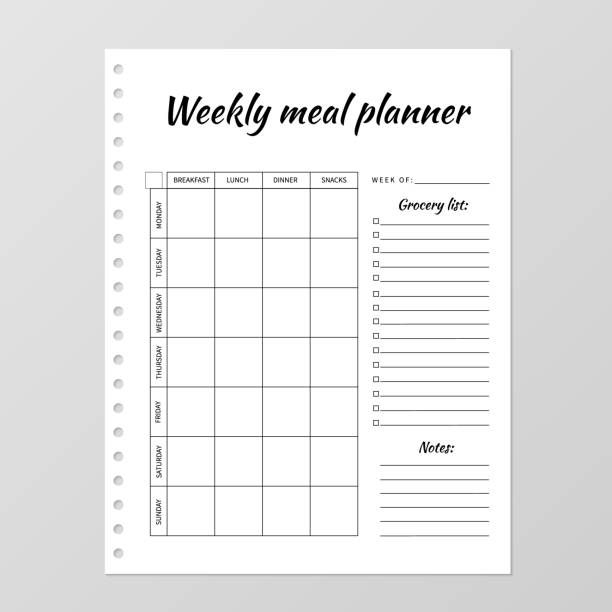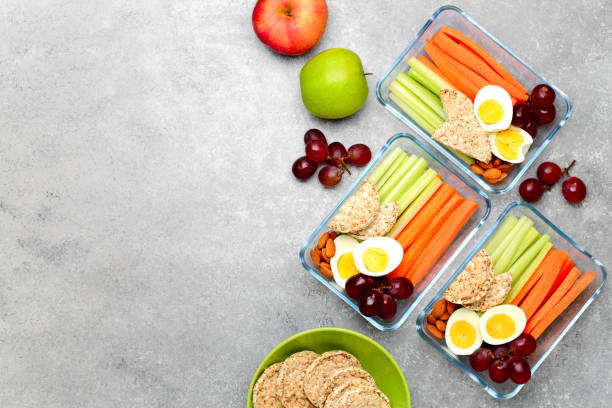9 Healthy Eating Tips for Extremely Busy Professionals

In today’s fast-paced world, maintaining a healthy lifestyle can be quite challenging, especially for those constantly on the go. However, taking care of our bodies and nourishing ourselves with nutritious food should never take a backseat, even as busy professionals.
That’s why we’re here to share some invaluable healthy eating tips for Very busy professionals to help you prioritize healthy eating, even when you’re juggling a hectic schedule. With these simple yet effective suggestions, you’ll be able to fuel your body with the right nutrients, boost your energy levels, and enhance your overall well-being.
So, let’s dive right in and discover some practical and actionable advice for embracing a healthy eating routine tailored to the needs of busy professionals.
Table of Contents
Tips Busy Professionals Should Follow to Eat Healthier?
1. Plan Weekly Meals Ahead for Success

As busy professionals, setting aside a few minutes each week to create a meal plan, you can ensure that you have a clear roadmap for healthy eating. This proactive approach saves you from the temptation of grabbing unhealthy convenience foods on the go and allows you to make intentional choices about what you eat.
To create a weekly meal plan, start by identifying the number of meals you’ll need for the week. Consider your work schedule, social commitments, and any planned outings. Then, list out the recipes or meal ideas you want to try.
Look for simple and time-efficient recipes that use fresh ingredients and can be prepared in batches. This way, you can cook once and have meals ready for multiple days, reducing your time spent in the kitchen.
Invest in quality food storage containers that keep your meals fresh and organized. When you have pre-prepared meals waiting in the fridge, you’ll be less likely to reach for unhealthy options or succumb to the convenience of fast food.
Another healthy option for extremely busy professionals is meal delivery services catering to various dietary preferences and restrictions.
2. Take Lean Protein, Vegetables and Whole Grains

As busy professionals, cook a batch of lean protein, such as grilled chicken or baked tofu, and portion it into individual servings. These can be used as the base for various meals throughout the week.
Keep nutritious snacks like hard-boiled eggs, Greek yoghurt, or pre-packaged servings of nuts in your fridge or pantry. These portable protein-rich options are perfect for those busy moments when you need a quick and satisfying bite.
your salads by adding lean proteins like grilled shrimp, sliced turkey breast, or chickpeas. Not only will this boost the nutritional value, but it will also make your salads more filling and satisfying.
When it comes to carbohydrates, not all are created equal. Whole grains are a healthier choice compared to refined carbohydrates, as they retain the bran, germ, and endosperm, providing more fibre, vitamins, and minerals.
Read labels for the term “whole grain” or “100% whole wheat” on the ingredient list of bread, pasta, and cereal products. Avoid products labelled as “refined” or “enriched,” as they have undergone processing that removes valuable nutrients.
Replace refined carbohydrates like white bread, white rice, and sugary cereals with their whole-grain counterparts. For example, choose whole wheat bread, brown rice, or oatmeal for a more nutritious option.
Keep fresh fruits and cut-up vegetables on hand for convenient and nutritious snacks. Preparing bite-sized portions in advance makes it easier to grab them when you’re on the go.
3. Go for Healthy snacks and reduce white flour intake

When you’re constantly on the move, finding healthy and convenient snack options is a challenge
Here are some healthy snack ideas for your busy days:
- Apples, bananas, grapes, and berries are portable, delicious, and packed with essential vitamins and fibre. Grab a piece of fruit as you head out the door, or pre-cut fruits and store them in containers for easy snacking.
- Almonds, walnuts, pumpkin seeds, and sunflower seeds are excellent sources of healthy fats and protein. Portion them into small, resealable bags or containers for a satisfying and nutrient-dense snack.
- Opt for single-serving containers of Greek yoghurt, which is high in protein and calcium. Pair it with fresh berries or a sprinkle of granola for added flavour and crunch.
- Carrot sticks, celery sticks, and sliced bell peppers are great options for crunchy and low-calorie snacks. Pack them in small containers along with a side of hummus or Greek yoghurt dip.
- Prepare homemade energy bars using nutritious ingredients like oats, nuts, dried fruits, and seeds. These bars can be made in advance and stored in the refrigerator or freezer for quick and wholesome snacking.
Read Also: Workouts and Diet Tips For Boosting Your Immune System Naturally.
4. Portion Control While Snacking
Snacking mindlessly without considering portion sizes can lead to overconsumption of calories which is not good for busy professionals. Portion control is a key aspect of optimizing your snacking routine. Here’s why it matters:
- Controlling portion sizes helps manage your overall caloric intake. Even with healthy snacks, consuming excessive amounts can contribute to weight gain. Use small containers or portion-out snacks in advance to avoid mindless eating.
- Eating appropriate portions ensures that you feel satisfied without feeling overly full. This helps prevent overeating during main meals and maintains a healthy balance in your overall diet.
- Practising portion control encourages mindfulness while eating. By paying attention to the amount of food you consume, you can fully savour and appreciate the flavours and textures, enhancing the enjoyment of your snack.
- Portion control allows you to maintain a balanced intake of essential nutrients. Instead of filling up on one type of snack, aim for a combination of protein, healthy fats, and carbohydrates for a well-rounded nutritional profile.
One of the most effective ways to optimize your snacking habits is by preparing homemade snacks in advance. This approach allows you to control your snacks’ ingredients, portion sizes, and nutritional value. Preparing homemade snacks in advance gives you greater control over your snacks’ ingredients, portion sizes, and nutritional value. It also saves you time and money, as you won’t be reliant on store-bought, often less healthy options.
5. Be a Smart Grocery Shopper
To stay focused and make healthier choices as very busy professionals doing a quick stop at the grocery store, create a shopping list.
Take a few minutes to plan your meals for the week ahead. Consider your breakfast, lunch, dinner, and snack options. This will help you determine the ingredients you need and avoid unnecessary purchases.
Before heading to the store, assess your pantry and refrigerator to see what items you already have. This prevents duplicate purchases and helps you use up ingredients that may be close to expiration.
Include a variety of whole foods on your list, such as fruits, vegetables, lean proteins, whole grains, and healthy fats. These items form the foundation of a nutritious diet.
Buy in bulk then, store in your freezer to ensure you always have nutritious options available.
Consider purchasing staple items like whole grains, nuts, seeds, and dried legumes in bulk. These items have a longer shelf life and can be stored for extended periods.
Buy fresh fruits and vegetables in bulk when they are in season or on sale. Wash, chop, and freeze them in portioned bags. Frozen fruits and vegetables retain their nutritional value and can be used for smoothies, soups, or stir-fries.
prepare larger batches of meals like soups, stews, or casseroles and freeze individual portions. This allows you to have homemade, nutritious meals available when you’re short on time.
6. As busy professionals, always stay hydrated

For busy professionals, staying hydrated offers several benefits that contribute to your overall productivity and well-being. It supports brain function, memory, and concentration.
Hydration is essential for optimal physical performance. Whether you’re engaged in exercise, sports, or demanding tasks, staying hydrated helps maintain stamina, prevent muscle cramps, and support joint lubrication.
Proper hydration aids in digestion and promotes a healthy metabolism. It helps your body break down and absorb nutrients from food more efficiently, supporting weight management and overall digestive health.
Staying hydrated regulates body temperature, especially during periods of physical exertion or exposure to high temperatures. It prevents overheating and supports your body’s cooling mechanisms.
Add slices of fresh fruits, such as lemon, cucumber, or berries, to your water for a refreshing and flavorful twist. Infused water adds a hint of natural sweetness and encourages you to drink more.
If you find it challenging to drink plain water, opt for herbal teas or flavoured water options. These alternatives provide hydration while offering a variety of tastes to suit your preferences.
Take foods with high water content, such as watermelon, cucumbers, oranges, and leafy greens, into your meals and snacks. These foods contribute to your overall hydration and provide additional nutrients.
Always have water readily available, whether at your desk, in your bag, or in your car. Having water within reach makes it easier to sip throughout the day.
7. Avoid foods with added sugars and unhealthy fats
While fast food and takeout may seem convenient when you’re busy, they often contain excessive calories, unhealthy fats, and added sugars. Minimizing their consumption will improve your health.
Reduce fast food and takeout consumption, you can take control of your food choices and make healthier decisions that support your well-being.
Processed and packaged foods are often high in added sugars, unhealthy fats, sodium, and artificial additives. Embrace cooking and prepare meals using fresh, unprocessed ingredients as much as possible. This way, you have control over the quality and nutritional value of your meals.
Added sugars and unhealthy fats are common culprits in many unhealthy food choices. Pay attention to ingredients like high fructose corn syrup, sucrose, or hydrogenated oils, as they indicate the presence of added sugars and unhealthy fats. Choose products with healthier alternatives or opt for whole food options instead.
When cooking at home, choose healthier fats like olive oil, avocado oil, or coconut oil instead of saturated or trans fats. These healthier fats can positively impact your cardiovascular health.
Reduce your reliance on added sugars by opting for natural sweeteners like honey, maple syrup, or fresh fruits. These options provide sweetness while offering additional nutrients.
8. Choose Healthy Options at Restaurants and Cafes
When dining out or grabbing a quick bite, it’s important to make mindful choices to maintain healthy eating as busy professionals.
Many restaurants and cafes now offer their menus online. Take a look beforehand and identify healthier options that align with your dietary preferences. Look for dishes that are grilled, baked, or steamed, and include plenty of vegetables.
Pick meals packed with nutrients and avoid options that are fried, heavily processed, or loaded with added sugars. Select dishes that feature lean proteins, whole grains, and a good amount of vegetables.
Don’t be afraid to ask for modifications to suit your dietary needs. Request sauces or dressings on the side, opt for whole grain bread or wraps and ask for additional vegetables or salad instead of fries.
Restaurant portions are often larger than what we actually need. Consider sharing a meal with a friend or ask for a to-go container and save half for another meal.
9. Cook your own meals at Home
Despite being busy professionals, dedicating time to cooking at home is a healthy lifestyle you should maintain.
Cooking at home allows you to have complete control over the quality and types of ingredients used in your meals. You can choose fresh, whole foods and avoid additives, preservatives, and unhealthy ingredients commonly found in processed and restaurant meals.
By cooking at home, you ensure appropriate portion sizes and create well-balanced meals. This helps you maintain a healthy weight and ensures you’re getting a variety of nutrients from different food groups.
Matter of Fact, Eating out or ordering takeout frequently just adds up expenses. Cooking at home saves you money by buying ingredients in bulk, planning meals ahead, and reducing food waste.
Opt for recipes that require minimal cleanup by utilizing one-pot or sheet pan cooking methods. Combine ingredients in a single pot or on a baking sheet, and let the oven or stovetop do the work. This saves time on both cooking and cleaning.
Look for recipes that are specifically designed for busy professionals and can be prepared in a short amount of time. These recipes often focus on simple and nutritious ingredients that come together quickly.
Use meal kit services or pre-prepped ingredients to streamline the cooking process. These services provide pre-measured ingredients and detailed instructions, saving you time on meal planning and grocery shopping.
Bottom Line on Healthy Eating Tips for Busy Professionals
These healthy eating tips for busy professionals are important small changes that align with your busy lifestyle. Take conscious steps towards healthier eating habits and nourish your body with wholesome foods.
Remember, even small changes can lead to significant improvements in your overall well-being. As busy professionals, find ways to take care of yourself and make health a priority. With determination, planning, and mindful choices, you can maintain a healthy lifestyle that supports your physical and mental well-being.
FAQs on Healthy Eating Tips for Busy Professionals
How does a busy lifestyle affect eating habits?
A busy lifestyle can significantly impact eating habits. When busy professionals have jam-packed schedules and limited time, they often resort to fast and convenient food options, which are typically high in calories, unhealthy fats, and added sugars. As a result, their overall diet becomes unbalanced, lacking essential nutrients such as vitamins, minerals, and fibre.




One Comment